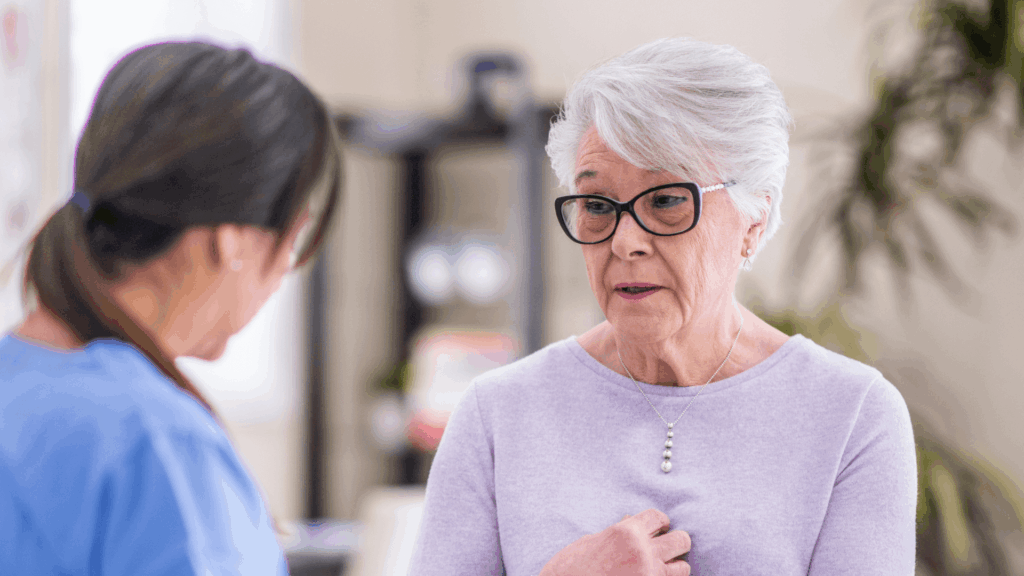By Karla Thorpe, Vice President, Programs and Priorities, Mental Health Commission of Canada
Today in Canada, thirteen people will die by suicide.
At least six of those people—nearly half—will have seen their family doctor in the four weeks prior to their death.
Nearly 45 per cent of people who died by suicide saw their primary care provider in the four weeks before their death.
-Talking About Suicide, Lesson 13: Your Role in Changing Suicidal Behaviours
For older adults, this number rises to almost 60 per cent.
The impact of a death by suicide ripples outward, like a rock tossed in a pond. I know this from over a decade of working alongside partners and lived experts in the suicide prevention space. Family, friends, and colleagues are left behind with broken hearts and unanswered questions.
As we mark World Suicide Prevention Day, we have the power to change this narrative.
That’s why the Mental Health Commission of Canada (MHCC) has teamed up with CHA Learning, the professional development division of HealthCareCAN. Together, we’re equipping health-care providers with the confidence and skills to open the door on difficult—but potentially lifesaving—conversations.
In Ontario, the demand for adult mental health services surged by 47 per cent between 2021 and 2022, while the need for children and youth services spiked by 104 per cent.
Our updated training, now called Talking About Suicide: Empowering Healthcare Providers, Instilling Hope in Clients, is available for free as a self-directed online course.
We took essential feedback from our original offering and refreshed the training to better reflect the post-pandemic reality.
The result is an engaging, informative, and easy-to-digest course that elevates health-care providers’ unique skills and cements their position as trusted patient confidants.
“The impact of a death by suicide ripples outward, like a rock tossed in a pond. I know this from over a decade of working alongside partners and lived experts in the suicide prevention space. Family, friends, and colleagues are left behind with broken hearts and unanswered questions.”
The Talking About Suicide training is accredited by the College of Family Physicians of Canada and the Canadian Nurses Association; however, it’s designed to be helpful to all health-care providers and allied health professionals.
A Course Designed for the Real-World
In our post-pandemic reality, health-care providers are stretched thinner than ever.
That’s why we’ve challenged ourselves to make this training even more accessible and immediately applicable than the original. For example, participants will wrap up their learning by applying their newly minted knowledge to two case studies. This practical, scenario-based context is yet another way we’ve responded to the need for relevant, hands-on experience.

With 6.5 million people in Canada lacking a family doctor, the front line of suicide prevention is expanding. We want to support everyone from physicians and pharmacists to registered nurses and physiotherapists. This includes those stepping into a role—like at a walk-in clinic—where trust has to be gained quickly.
What can Health-care Providers Expect to Learn?
Talking About Suicide is designed to walk participants through everything from understanding suicide and its complex causes to practical interventions and appropriate language to use. It will help practitioners:
- Move beyond fear to have direct, confident conversations
- Create a trusted connection, even when short on time
- Identify and explore suicide risk factors and warning signs
- Tailor responses to individual needs and circumstances
- Collaborate on a safety plan with practical tools
- Reduce stigma and promote hope and recovery
Talking about suicide won’t ‘put an idea in someone’s head.’ In fact, it often helps free them from feelings of isolation.
– Talking About Suicide, Lesson 12: Suicide Myths and Realities
We’ve heard from early participants that the training’s emphasis on “Asking Questions” is especially valuable, providing tried-and-true examples of how to phrase tough questions. (Directly, with empathy, and avoiding euphemisms are good places to start.)
Following the training, 96 per cent of the health-care providers we surveyed reported feeling confident about discussing suicide with their clients. Many specifically highlighted how valuable it was to learn practical ways to ask difficult questions and build rapport quickly—even in time-constrained settings.
Talking About Suicide also considers the well-being of providers. As one participant reflected, “The self-care reminders were exceptionally helpful, validating, and something to be mindful of as healthcare providers.”
Supporting patients experiencing suicidal ideation isn’t easy. But by taking the pulse on their own mental wellness and using effective self-care strategies, health-care providers will be better able to care for themselves and others.
Because you can’t pour from an empty cup.
Learning from Those Who’ve Lived It
One of the greatest strengths of Talking About Suicide is the “nothing about us without us” ethos.
The course features powerful testimonials from suicide attempt survivors like Megan, who shares her experience of discussing suicidal thoughts with her family physician. She explains that being linked up with a counsellor who could connect her with cultural practices was key to her recovery.

Likewise, Saadiye advises practitioners that survivors of a suicide attempt need to be reminded of their strengths.
These insightful “dos” are key to helping health-care providers unlock compassionate care and create safe, supportive spaces.
The MHCC and CHA Learning are grateful to our Talking About Suicide Advisory Committee—made up of family doctors, registered nurses and nurse practitioners, suicide prevention experts, and crucially, people with lived and living experience.
Their guidance grounded this learning in real-world wisdom, helping ensure providers are equipped with the skills to meet the authentic needs of those experiencing thoughts of suicide, while being mindful of their own wellness.
An Investment Worth Making
Three hours. That’s all it takes.
On World Suicide Prevention Day, I urge health-care providers across Canada to make this small investment of time.
Three hours to learn from lived experience.
Three hours to change the narrative.
Three hours to build a lifetime of confidence.
The revised Talking About Suicide course is free, accredited, and accessible—built to meet rising demands within an overstressed system.
To take a page from the Centre for Suicide Prevention, “The vast majority of people who receive a caring intervention do not re-attempt. People considering suicide want an active listening ear more than anything else.”
Remember, you’ll never know what someone is thinking until you ask them.
And having the right words can make all the difference.
This training is part of MHCC’s broader commitment to “Changing the Narrative on Suicide”—this year’s World Suicide Prevention theme—and complements our community-based Roots of Hope initiative and other evidence-based suicide prevention strategies.
About the MHCC:
The Mental Health Commission of Canada (MHCC) is a national not-for-profit organization, committed to reducing stigma and improving access to quality mental health and substance use services across Canada. The MHCC collaborates with leading experts, nationally and internationally, including people with lived and living experience, to develop national standards and strategies, promote innovation, enhance mental health literacy, and advise and equip all levels of government to improve mental health outcomes for those living in Canada.
About CHA Learning and HealthCareCAN:
CHA Learning is Canada’s only national, fully online learning provider serving all of healthcare and the professional development division of HealthCareCAN. For nearly 75 years, CHA Learning’s distance learning programs and courses have helped tens of thousands of health professionals from across Canada to be successful in their careers.
HealthCareCAN is the national voice of hospitals, health authorities, health research, and healthcare organizations across Canada. We foster informed and continuous, results-oriented discovery and innovation across the continuum of healthcare.





